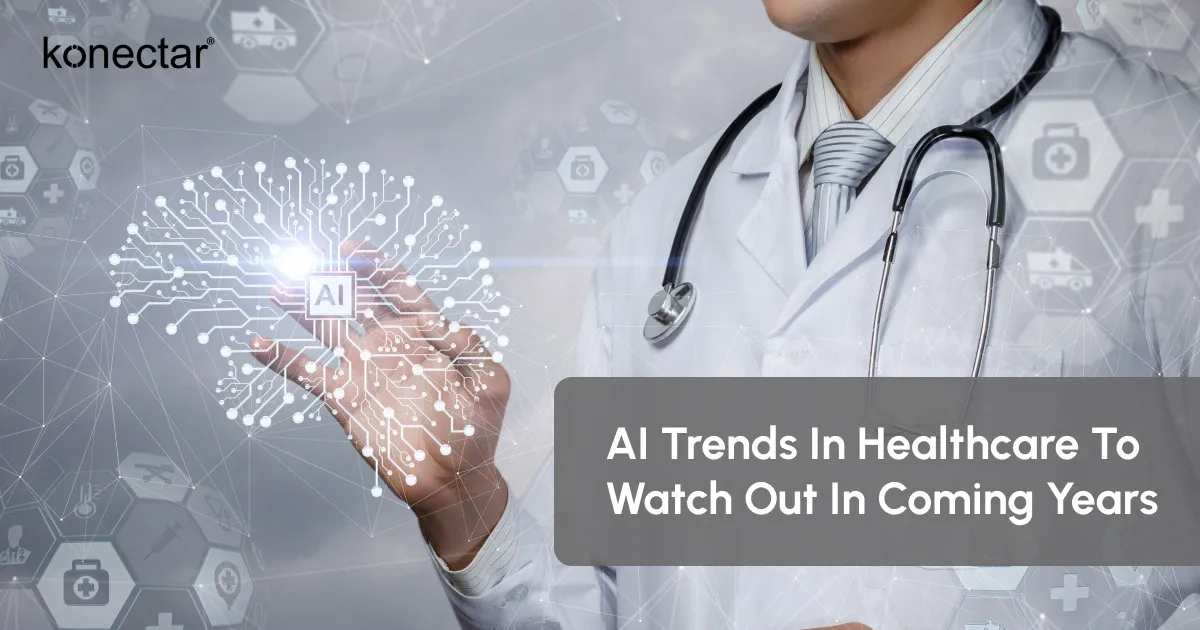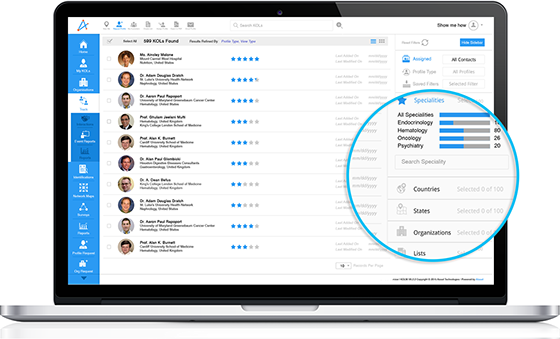13-08-2024
AI Trends in Healthcare to Watch in the Coming Years

From creating the first successful clone of a sheep Dolly in 1996 to today’s widespread implementation of artificial intelligence in healthcare, medical science has indeed come a long way. The progression of artificial intelligence technology has compounded the skills of Healthcare Professionals (HCPs) and empowered them to deliver care to patients more efficiently.
In this article:
While we can draw inspiration from the pioneering minds that have driven miraculous advancements in science and technology, it is equally imperative for us to stay informed about current trends and advancements. This ongoing awareness ensures we remain knowledgeable and adaptable in a rapidly evolving field. Further we will learn about the different AI trends that are driving transformation in healthcare!
AI in healthcare: Top trends to keep an eye on
1. Predictive Analytics for Early Diagnosis and Treatment
AI-powered predictive analytics are revolutionizing early diagnosis and treatment. Predictive analytics uses historical data, machine learning techniques, and statistical models to anticipate future events and outcomes.
In healthcare, this technology allows healthcare providers to examine vast volumes of patient data such as medical records and clinical information and uncover patterns for identifying potential health risks, improve diagnostic accuracy, and enhance treatment strategies, potentially preventing adverse events.
Predictive analytics is especially useful in spotting individuals at high risk for specific diseases. This allows for early intervention and more effective management of conditions. For instance, by evaluating patient data such as genetic information, lifestyle habits, and medical history, predictive models can identify those at risk for cancer or cardiovascular diseases. This enables healthcare professionals to suggest preventive measures, such as lifestyle changes, medication, and regular check-ups early on to reduce risks and improve patient health outcomes.
2. AI-Driven Personalized Medicine
Artificial intelligence software has the potential to transform personalized medicine by improving the precision of diagnoses, treatment selection, and disease prediction for conditions like cancer, diabetes, and genetic disorders. They enable the development of tailored treatment plans based on individual characteristics, such as genetic makeup and disease stage. This will significantly enhance patient outcomes and reduce healthcare costs.
While AI’s impact on personalized medicine is still evolving, its potential to revolutionize healthcare is substantial. As this technology continues to develop, ensuring its ethical use and maintaining data accuracy will remain crucial.
3. Robotic Process Automation (RPA) in Administrative Tasks
The implementation of robotic process automation (RPA) can help automate various tasks such as patient scheduling, billing, claims processing, reporting, and data entry. This leads to fewer errors, time savings, and allows staff to focus on more value-added activities. For example, RPA enables patients to book appointments online and sends automatic reminders, reducing no-show rates and streamlining the scheduling process.
4. AI in Drug Discovery and Development
Artificial intelligence tools are accelerating drug discovery and development processes by analyzing complex biological data, predicting drug interactions, and identifying potential drug candidates faster. AI-driven platforms can significantly shorten the drug development timeline and reduce costs. This will help bring new treatments to market more quickly.
5.Telemedicine and AI Integration
The integration of AI with telemedicine platforms has enhanced remote consultations. AI algorithms further can assist in diagnosing symptoms based on patient input, providing recommendations, and monitoring patient progress through digital tools. This integration will ensure more effective remote healthcare delivery and better patient management.
Artificial Intelligence in Healthcare: Market Analysis
The global market for AI in healthcare was valued at $19.27 billion in 2023, and it's projected to grow at an annual rate of 38.5% from 2024 to 2030. This growth is primarily driven by the healthcare sector's need for greater efficiency, accuracy, and improved patient outcomes. A recent study done in March 2024 revealed that 79% of healthcare organizations are already using AI technology.
Moreover, these organizations typically see a return on investment (ROI) within 14 months, with every dollar spent on AI yielding $3.20. The rapid increase in healthcare data from sources like electronic health records (EHRs), medical imaging scans, wearable devices, and genomic sequencing offers vast opportunities for AI-powered solutions to provide actionable insights and aid in clinical decision-making. Additionally, the shortage of healthcare professionals is accelerating the adoption of AI and machine learning (ML) technologies.
Future Scope
The future of AI in healthcare looks promising, with AI-driven solutions poised to bring significant advantages to the industry. These benefits include enhanced patient care, increased efficiency, reduced costs, and expedited drug delivery.
To fully harness these benefits, regulatory bodies must adapt to the changing AI landscape, finding a balance between encouraging innovation and ensuring patient safety. At the same time, healthcare organizations need to stay ahead by addressing new regulations, offering training opportunities, and considering the ethical implications of AI.
As we move forward, the integration of AI in healthcare will not only transform how care is delivered but also improve outcomes for patients worldwide, making healthcare more accessible and effective for everyone.
FAQs
- What is artificial intelligence in healthcare?
Artificial intelligence in healthcare refers to the use of AI technologies to analyze medical data, enhance diagnostic accuracy, personalize treatment, and automate administrative tasks, ultimately improving patient care and operational efficiency.
- How does AI contribute to personalized medicine?
AI contributes to personalized medicine by analyzing genetic information, patient history, and lifestyle factors to tailor treatments to individual patients, leading to more effective and targeted therapies.
- How is AI used in drug discovery?
AI is used in drug discovery to analyze complex biological data, predict drug interactions, and identify potential drug candidates more efficiently, thereby accelerating the development process and reducing costs.
- How does AI contribute to managing chronic diseases?
AI contributes to managing chronic diseases by continuously monitoring patient data, predicting disease flare-ups, providing personalized treatment recommendations, and helping patients adhere to their treatment plans through automated reminders and support.





